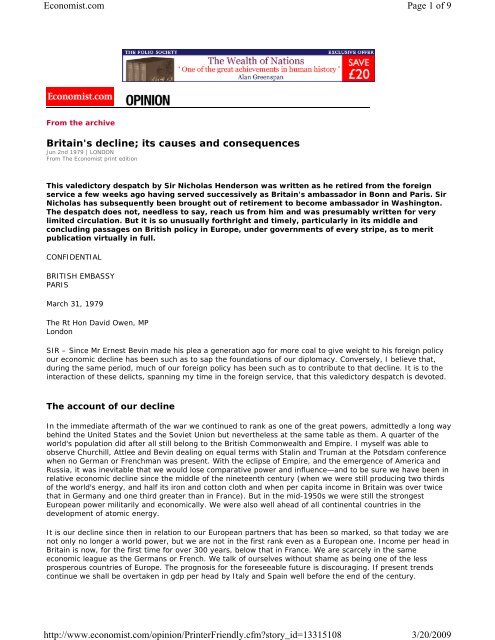Britain's decline; its causes and consequences Page 1 of 9 ...
Britain's decline; its causes and consequences Page 1 of 9 ...
Britain's decline; its causes and consequences Page 1 of 9 ...
Create successful ePaper yourself
Turn your PDF publications into a flip-book with our unique Google optimized e-Paper software.
Economist.com<br />
http://www.economist.com/opinion/PrinterFriendly.cfm?story_id=13315108<br />
<strong>Page</strong> 1 <strong>of</strong> 9<br />
3/20/2009<br />
From the archive<br />
<strong>Britain's</strong> <strong>decline</strong>; <strong>its</strong> <strong>causes</strong> <strong>and</strong> <strong>consequences</strong><br />
Jun 2nd 1979 | LONDON<br />
From The Economist print edition<br />
This valedictory despatch by Sir Nicholas Henderson was written as he retired from the foreign<br />
service a few weeks ago having served successively as <strong>Britain's</strong> ambassador in Bonn <strong>and</strong> Paris. Sir<br />
Nicholas has subsequently been brought out <strong>of</strong> retirement to become ambassador in Washington.<br />
The despatch does not, needless to say, reach us from him <strong>and</strong> was presumably written for very<br />
limited circulation. But it is so unusually forthright <strong>and</strong> timely, particularly in <strong>its</strong> middle <strong>and</strong><br />
concluding passages on British policy in Europe, under governments <strong>of</strong> every stripe, as to merit<br />
publication virtually in full.<br />
CONFIDENTIAL<br />
BRITISH EMBASSY<br />
PARIS<br />
March 31, 1979<br />
The Rt Hon David Owen, MP<br />
London<br />
SIR – Since Mr Ernest Bevin made his plea a generation ago for more coal to give weight to his foreign policy<br />
our economic <strong>decline</strong> has been such as to sap the foundations <strong>of</strong> our diplomacy. Conversely, I believe that,<br />
during the same period, much <strong>of</strong> our foreign policy has been such as to contribute to that <strong>decline</strong>. It is to the<br />
interaction <strong>of</strong> these delicts, spanning my time in the foreign service, that this valedictory despatch is devoted.<br />
The account <strong>of</strong> our <strong>decline</strong><br />
In the immediate aftermath <strong>of</strong> the war we continued to rank as one <strong>of</strong> the great powers, admittedly a long way<br />
behind the United States <strong>and</strong> the Soviet Union but nevertheless at the same table as them. A quarter <strong>of</strong> the<br />
world's population did after all still belong to the British Commonwealth <strong>and</strong> Empire. I myself was able to<br />
observe Churchill, Attlee <strong>and</strong> Bevin dealing on equal terms with Stalin <strong>and</strong> Truman at the Potsdam conference<br />
when no German or Frenchman was present. With the eclipse <strong>of</strong> Empire, <strong>and</strong> the emergence <strong>of</strong> America <strong>and</strong><br />
Russia, it was inevitable that we would lose comparative power <strong>and</strong> influence—<strong>and</strong> to be sure we have been in<br />
relative economic <strong>decline</strong> since the middle <strong>of</strong> the nineteenth century (when we were still producing two thirds<br />
<strong>of</strong> the world's energy, <strong>and</strong> half <strong>its</strong> iron <strong>and</strong> cotton cloth <strong>and</strong> when per capita income in Britain was over twice<br />
that in Germany <strong>and</strong> one third greater than in France). But in the mid-1950s we were still the strongest<br />
European power militarily <strong>and</strong> economically. We were also well ahead <strong>of</strong> all continental countries in the<br />
development <strong>of</strong> atomic energy.<br />
It is our <strong>decline</strong> since then in relation to our European partners that has been so marked, so that today we are<br />
not only no longer a world power, but we are not in the first rank even as a European one. Income per head in<br />
Britain is now, for the first time for over 300 years, below that in France. We are scarcely in the same<br />
economic league as the Germans or French. We talk <strong>of</strong> ourselves without shame as being one <strong>of</strong> the less<br />
prosperous countries <strong>of</strong> Europe. The prognosis for the foreseeable future is discouraging. If present trends<br />
continue we shall be overtaken in gdp per head by Italy <strong>and</strong> Spain well before the end <strong>of</strong> the century.
Economist.com<br />
http://www.economist.com/opinion/PrinterFriendly.cfm?story_id=13315108<br />
<strong>Page</strong> 2 <strong>of</strong> 9<br />
3/20/2009<br />
A few figures tell the tale <strong>of</strong> our relative <strong>decline</strong>:<br />
In 1954 French gdp was 22% lower than our own; German gdp was 9%<br />
lower. By 1977 French gdp was 34% higher, <strong>and</strong> German gdp 61% higher<br />
than ours.<br />
Productivity (ie, output per person employed) was about the same in<br />
Britain, France <strong>and</strong> West Germany in 1954, with Britain marginally<br />
highest. The following table (see below) shows how we have fallen behind<br />
since then.<br />
The exchange rate at any one time may certainly have distorted comparisons <strong>of</strong> the purchasing power <strong>of</strong> the<br />
pound in relation to the franc <strong>and</strong> the mark, in the sense that a pound could buy more in London than <strong>its</strong><br />
equivalent at the prevailing rate <strong>of</strong> exchange in Paris <strong>and</strong> Frankfurt, with the result that the index figures for<br />
Britain in the above figures may be too low. But the trends, which are based on one price level <strong>and</strong> constant<br />
exchange rates, emerge clearly.<br />
As regards percentage <strong>of</strong> world trade Britain has likewise <strong>decline</strong>d badly in<br />
relation to France <strong>and</strong> Germany.<br />
What the apologists will say<br />
I am aware <strong>of</strong> the efforts made to contest the relevance <strong>of</strong> these statistics.<br />
Many people believe that the lower prices that exist in Britain <strong>of</strong>fset the<br />
impact on living st<strong>and</strong>ards <strong>of</strong> relatively inferior wages. But you cannot get<br />
away from the fact that a low gdp means a smaller national cake <strong>and</strong> that there is less wealth to go round.<br />
Some will assert that the figures do not represent the true relative strength. Others will argue that the British<br />
way <strong>of</strong> life, with ingenuity <strong>and</strong> application devoted to leisure rather than to work, is superior to that elsewhere<br />
<strong>and</strong> is in any case what people want. I do not doubt this; nor do I question the agreeableness or quality <strong>of</strong> life<br />
in Britain or the tolerance <strong>of</strong> the British people. There is depth in our society that others have not achieved.<br />
This is inestimable—though it cannot be taken for granted. My purpose is to show how we are faring in relation<br />
to others <strong>and</strong> to suggest the possible effect on our lives <strong>of</strong> continuing <strong>decline</strong>.<br />
On the basis <strong>of</strong> historical experience it seems to me that it would be wrong<br />
to assume that a way <strong>of</strong> life, based as ours is on a relatively favourable<br />
<strong>and</strong> stable economy, will necessarily remain unimpaired if the conditions<br />
change. I cannot say that I have much sympathy for those who seek to<br />
justify our present state <strong>of</strong> affairs by a pastoral apologia. They remind me<br />
<strong>of</strong> the French <strong>and</strong> German nobility <strong>of</strong> the eighteenth <strong>and</strong> nineteenth<br />
centuries who were against progress which was synonymous with<br />
industrialisation. In any case Britain has a large population, accustomed to<br />
<strong>and</strong> skilled in industrial life, who, within the confines <strong>of</strong> the British Isles, would suffer a sharp drop in st<strong>and</strong>ards<br />
if they were destined to become the pioneers <strong>of</strong> a de-industrial revolution.<br />
You only have to move about western Europe nowadays to realise how<br />
poor <strong>and</strong> unproud the British have become in relation to their neighbours.<br />
It shows in the look <strong>of</strong> our towns, in our airports, in our hospitals <strong>and</strong> in<br />
local amenities; it is painfully apparent in much <strong>of</strong> our railway system,<br />
which until a generation ago was superior to the continental one. In<br />
France, for instance, it is evident in spending on household equipment <strong>and</strong><br />
in the growth <strong>of</strong> second homes. But lest these be thought subjective<br />
judgments let me give two figures that illustrate what has happened over<br />
the past 20 years or so.<br />
Nor do I believe that counter-attack based on our recent reduction in<br />
inflation affects the general picture. (This <strong>and</strong> other retorts are <strong>of</strong> course<br />
required for immediate diplomatic purposes; but that is outside the scope<br />
<strong>of</strong> this despatch.) Such a line <strong>of</strong> argument begs the question <strong>of</strong> why we<br />
ever allowed inflation to rocket in 1975 to rates far higher than those in<br />
France or Germany. Nor does it touch the essential <strong>and</strong> long-term
Economist.com<br />
http://www.economist.com/opinion/PrinterFriendly.cfm?story_id=13315108<br />
<strong>Page</strong> 3 <strong>of</strong> 9<br />
3/20/2009<br />
problem <strong>of</strong> productivity. Output per man-hour in manufacturing industry<br />
(in £ per hour) was as follows in 1977:<br />
Britain 2.70<br />
France 4.50<br />
Germany 7.10<br />
Contributory <strong>causes</strong><br />
This is not the place to discuss comprehensively the <strong>causes</strong> <strong>of</strong> our poor productivity which epitomises our<br />
<strong>decline</strong>. The subject is not one <strong>of</strong> easy solution. But having spent the past seven years in France <strong>and</strong> the<br />
Federal Republic <strong>of</strong> Germany I have been struck by certain comparisons.<br />
Management<br />
(a) Generalisations on this subject are inevitably unscientific. In many British industries there is no doubt<br />
about the high quality <strong>of</strong> management. But anyone serving abroad soon becomes aware <strong>of</strong> a lack <strong>of</strong><br />
pr<strong>of</strong>essionalism in British management. We have a different attitude towards a career in industry. In the<br />
federal republic—as indeed in Germany since the time <strong>of</strong> Bismarck—industry has tended to attract the best<br />
people, whereas in the United Kingdom those leaving school <strong>and</strong> university seem less prepared to make a<br />
career in industry than to join a merchant bank in the City <strong>of</strong> London or one <strong>of</strong> the public services. It is partly a<br />
question <strong>of</strong> tradition <strong>and</strong> prestige but also one <strong>of</strong> finance. According to the latest figures, the average salary <strong>of</strong><br />
a middle-grade manager, adjusted for taxes <strong>and</strong> differences in cost <strong>of</strong> living, is nearly twice as high in France<br />
<strong>and</strong> Germany as in the United Kingdom.<br />
(b) In France, industry for a long time did not attract the best people, a failure that was partly responsible for<br />
France's delayed industrialisation. But there has been a remarkable change in outlook in the past quarter <strong>of</strong> a<br />
century <strong>and</strong> the elite <strong>of</strong> the country, such as those who graduate from the Ecole Nationale d'Administration,<br />
move freely between the top ranks <strong>of</strong> government <strong>and</strong> industry. There is a certain parallelism here between<br />
France <strong>and</strong> America. The present French foreign minister, Mr Francois-Poncet, began his career in the foreign<br />
service <strong>and</strong> then had a spell in industry before returning to the public Service. Or take the new head <strong>of</strong><br />
Peugeot-Citroen, Mr Jean-Paul Parayre, who at the age <strong>of</strong> 41 holds one <strong>of</strong> the most onerous posts in the<br />
country. A graduate <strong>of</strong> the Ecole Polytechnique, he worked as an <strong>of</strong>ficial in the department <strong>of</strong> industry before<br />
leaving the civil service to enter industry. His present salary is over twice that <strong>of</strong> the chairman <strong>of</strong> British<br />
Leyl<strong>and</strong>, leaving many fringe benef<strong>its</strong> out <strong>of</strong> account. The maximum tax on his salary is 60%, whereas that on<br />
Mr Edwardes's is 83%.<br />
(c) Unfortunately, there is evidence here <strong>of</strong> the drain upon our engineering <strong>and</strong> managerial resources produced<br />
by the poor relative financial rewards in British industry. Not only are British engineers <strong>and</strong> managers leaving<br />
Britain for overseas French projects but they are coming to work for French <strong>and</strong> multinational firms in France.<br />
For example, one major French engineering firm employs 10 British engineers in Paris. It is relevant to record<br />
here the great importance the French attach to their famous engineering schools (the Polytechnique <strong>and</strong> the<br />
Ponts et Chaussees, etc) <strong>and</strong> to the training <strong>of</strong> engineers as all-round managers. This opens up for the<br />
pr<strong>of</strong>ession the plums <strong>of</strong> high industrial comm<strong>and</strong>.<br />
(d) So far as the management <strong>of</strong> major capital projects by government is concerned our vision appears limited<br />
<strong>and</strong> our purpose changeable, at any rate compared with France <strong>and</strong> Germany. This is particularly noticeable in<br />
transport. We started work on two large plans, the third London airport <strong>and</strong> the Channel tunnel, only to cancel<br />
both. To arrive nowadays at London Airport from a French or German airport is to be made immediately aware<br />
that our st<strong>and</strong>ards have slipped.<br />
Trade-union structure <strong>and</strong> labour relations<br />
(e) In trade-union structure, as in management, our present difficulties are rooted in the distant past; they do<br />
not arise from recent decisions <strong>and</strong> cannot be quickly or easily cured.<br />
(f) Neither Germany nor France has craft unions. Membership is based not on occupation but on the industry
Economist.com<br />
http://www.economist.com/opinion/PrinterFriendly.cfm?story_id=13315108<br />
<strong>Page</strong> 4 <strong>of</strong> 9<br />
3/20/2009<br />
in which the person works. There is, therefore, no temptation for one craft in an industry to pursue <strong>its</strong><br />
sectional interests at the expense <strong>of</strong> another or <strong>of</strong> the company as a whole. The number <strong>of</strong> trade unions in the<br />
two countries is much smaller than in the United Kingdom, as is the proportion <strong>of</strong> the work force belonging to<br />
them. In Germany there are 17 industrial unions fully integrated within the DGB (German trade-union<br />
federation). Since each <strong>of</strong> these unions would have members among all grades <strong>of</strong> manual <strong>and</strong> clerical workers<br />
in the plant they would not have conflicting sectional interests. French trade unions are grouped into six major<br />
confederations. A major employer in the engineering industry would have to deal with not more than three<br />
unions, <strong>and</strong> each <strong>of</strong> these unions would claim to represent all workers in the plant. There are 115 trade unions<br />
affiliated to the Trades Union Congress in Britain.<br />
(g) These features make it easier in France <strong>and</strong> Germany to negotiate settlements <strong>and</strong> to make them stick.<br />
(h) In both Germany <strong>and</strong> France the closed shop is against the constitution, hence illegal; in both countries<br />
collective agreements are binding contracts enforceable in law. In neither country is it the practice for people<br />
to go on strike before a wage agreement has expired (in Germany it is illegal to do so). In contrast to Britain,<br />
strikers in Germany <strong>and</strong> France do not receive regular income-tax rebates while they are on strike. Nearly<br />
always in Britain in recent years a strike has led to a very favourable settlement for the employees; in France<br />
<strong>and</strong> Germany this has not been so, eg, the steel strike in Germany <strong>and</strong> the air traffic controllers' work to rule<br />
in France. The labour counsellor here cannot think <strong>of</strong> a single strike in France in the past two years that has<br />
achieved <strong>its</strong> objective.<br />
(i) There is no shop-floor control over production in France as there is in Britain. No French manager thinks<br />
twice about changing people's duties or their timetables if that is required for efficiency, nor does he hesitate<br />
to install new machinery <strong>and</strong> instruct people that from Monday onwards they will be working at x instead <strong>of</strong> y.<br />
Neither in France nor Germany has responsibility for production shifted out <strong>of</strong> the h<strong>and</strong>s <strong>of</strong> management into<br />
those <strong>of</strong> trade-union representatives.<br />
(j) The paradox <strong>of</strong> the British labour scene at the present time is that, despite the contribution our unions have<br />
made towards a better safety record in our factories, their influence <strong>and</strong> ready resort to strike pressure have<br />
not secured better general employment conditions than in France <strong>and</strong> Germany: not only are real wages lower<br />
but hours <strong>of</strong> work are longer.<br />
(k) The following figures are telling:<br />
Inter-relation between the economy <strong>and</strong> foreign policy<br />
The bearing <strong>of</strong> our weakness upon our foreign policy is almost too obvious<br />
to require analysis. In the immediate postwar world we were the second<br />
most important power in the Far East with all the influence that that<br />
carried. We played a major part in the 1954 Geneva conference on<br />
Indochina <strong>and</strong> in the formation <strong>of</strong> the South-east Asia Treaty Organisation<br />
the same year. We were the predominant power in the Middle East from<br />
Iran to Libya, from Iraq to Aden; we were the only outside power that had troops there, except for the<br />
Russians for a short time in northern Iran. The Suez debacle in 1956 was a sudden eye-opener to the <strong>decline</strong><br />
<strong>of</strong> British power in the eastern Mediterranean—as indeed it contributed to it. Our subsequent withdrawal from<br />
the Gulf—which as many predicted was followed by the loss <strong>of</strong> western influence over the price <strong>of</strong> oil—may<br />
have been inevitable at some stage, but it was precipitated by the devaluation crisis <strong>of</strong> 1967. General de<br />
Gaulle was able to say the some year that the United Kingdom was too weak economically to be able to join<br />
the common market.<br />
At the present time, although we still retain certain extra-European responsibilities, eg, in Rhodesia <strong>and</strong><br />
Cyprus, we are unable to influence events in the way we want because we do not have the power or will to do<br />
so. It is true that we may have a special relationship with America, <strong>and</strong>, based as this is upon certain shared<br />
traditions <strong>and</strong> responsibilities, it will continue.<br />
But anyone who has followed American policy towards Europe closely over the past few years will know how<br />
much our role as Washington's European partner has <strong>decline</strong>d in relation to that <strong>of</strong> Germany or France. France,<br />
in fact, over a period <strong>of</strong> nearly two decades pursued a blatantly anti-American policy, but <strong>its</strong> importance to<br />
America is much greater now than at the beginning <strong>of</strong> that period, because <strong>of</strong> <strong>its</strong> economic strength.
Economist.com<br />
http://www.economist.com/opinion/PrinterFriendly.cfm?story_id=13315108<br />
<strong>Page</strong> 5 <strong>of</strong> 9<br />
3/20/2009<br />
As regards Europe, the fact must be faced that for the first time for centuries British policy cannot be based<br />
upon the prevention <strong>of</strong> any single power dominating the continent because, out <strong>of</strong> weakness, we would be<br />
unable to do this. For more than a decade after 1945 we held back from joining in schemes <strong>of</strong> greater<br />
European unity; we were confident <strong>of</strong> our superior strength in relation to our European neighbours, <strong>and</strong> we did<br />
not think that anything would succeed without us. Then when the others showed that they were determined to<br />
go ahead on their own we found that we were unable to prevent them doing so or to shape what emerged in<br />
the way we wanted. For long we underestimated the economic prospects <strong>of</strong> our European neighbours <strong>and</strong> for<br />
even longer we overestimated our own strength <strong>and</strong> influence in relation to them.<br />
The recent intensification in the Paris-Bonn relationship owes a good deal to our economic weakness, as to our<br />
a-European diplomacy. President Giscard is not really very interested in us at the moment <strong>and</strong> gives the<br />
impression that Anglo-French relations only feature in his mind when the annual summit comes along. It is<br />
sometimes said in London that if only we pursued our interests in Europe as ruthlessly as the French did we<br />
would have a scoring rate as high as theirs. This is another example <strong>of</strong> how we overestimate our influence <strong>and</strong><br />
our nuisance value: we do not count in Europe like the French; the other countries <strong>of</strong> the community know<br />
that they can get along quite well—some say better—without us as they have done for years. But there is<br />
another distinction which I must make in parenthesis here. French policy is certainly hard-headed now, but<br />
there is more to it than that: it is constructive about Europe (eg, direct elections, the European Council, the<br />
Three Wise Men) which makes the ruthlessness both more effective <strong>and</strong> more acceptable to the rest <strong>of</strong> the<br />
community.<br />
I should also interject here that British representatives abroad naturally do their best to prevent too<br />
pessimistic a picture <strong>of</strong> our economy from gaining ground; <strong>and</strong>, indeed, there are important tasks <strong>of</strong> correction<br />
<strong>and</strong> proportion to be carried out. But the facts <strong>of</strong> our <strong>decline</strong> are too well known for us to be able to persuade<br />
foreign observers that there is really little wrong with our industrial scene. Indeed we harp on our poverty to<br />
justify our plea for budgetary changes in the community. In France we have come nowadays to be identified<br />
with malaise as closely as in the old days we were associated with success. In many public statements Britain<br />
is mentioned as a model not to follow if economic disaster is to be avoided. It is striking how, at French<br />
functions where a British representative is present <strong>and</strong> there is a need for some obliging observation about us<br />
to be made, speakers seem unable to find anything to refer to that has happened since 1940-45, a period<br />
which still indeed affords us a good deal <strong>of</strong> capital. The French press is full <strong>of</strong> articles about <strong>Britain's</strong> plight, not<br />
least depressing for their patronising search for favourable elements such as our language <strong>and</strong> our humour.<br />
Foreign policy decisions<br />
We had every western European government ready to eat out <strong>of</strong> our h<strong>and</strong> in the immediate aftermath <strong>of</strong> war.<br />
For several years our prestige <strong>and</strong> influence were paramount <strong>and</strong> we could have stamped Europe as we<br />
wished. Jean Monnet <strong>and</strong> others on the continent had originally hoped to build a European economic union<br />
around the nucleus <strong>of</strong> a Franco-British union. It was the failure <strong>of</strong> the British to respond to this idea that led<br />
them to explore alternative approaches, in particular the idea <strong>of</strong> a coal <strong>and</strong> steel community based upon a<br />
Franco-German rather than a Franco-British axis. This was a turning-point in postwar history. The French were<br />
not very tactful in the way they confronted the British government with the proposals for the Schuman plan.<br />
But Monnet knew by 1950 that the British government was not prepared to make the leap necessary to join<br />
the sort <strong>of</strong> organisation that he was thinking <strong>of</strong>, one that would achieve lasting Franco- German reconciliation<br />
<strong>and</strong> set Europe on a new course. He sensed that London did not really believe that the idea would come <strong>of</strong>f,<br />
<strong>and</strong> that in any case their fears <strong>of</strong> supranationality would deter them. He was correct in his analysis.<br />
But what is amazing looking back is the way in which the British government reached so important a decision.<br />
The full British cabinet never dealt with the question. Neither the prime minister, nor the foreign secretary (Mr<br />
Bevin was in hospital), nor the chancellor <strong>of</strong> the exchequer, nor the lord chancellor, were present at the<br />
ministerial meeting which took the decision against British participation in the European Coal <strong>and</strong> Steel<br />
Community (ECSC). At the start <strong>of</strong> his foreign secretaryship, Mr Ernest Bevin was in favour <strong>of</strong> a European<br />
customs union, but this was anathema in the rest <strong>of</strong> Whitehall, particularly in the treasury <strong>and</strong> board <strong>of</strong> trade.<br />
Furthermore, as the centre <strong>and</strong> right came to power in France <strong>and</strong> West Germany in the late 1940s, the ideal<br />
<strong>of</strong> a socialist Europe, for which there had been enthusiasm in the Labour party, looked impracticable.<br />
Continental socialists continued to favour progress towards European union <strong>and</strong> this difference in outlook came<br />
to be an important cause <strong>of</strong> the gap that has existed ever since between them <strong>and</strong> the Labour party. In 1950<br />
the national executive committee <strong>of</strong> the Labour party declared: “In every respect, except distance, we in<br />
Britain are closer to our kinsmen in Australia <strong>and</strong> New Zeal<strong>and</strong> on the far side <strong>of</strong> the world than we are to
Economist.com<br />
http://www.economist.com/opinion/PrinterFriendly.cfm?story_id=13315108<br />
<strong>Page</strong> 6 <strong>of</strong> 9<br />
3/20/2009<br />
Europe.”<br />
In his maiden speech in the house <strong>of</strong> commons, Mr Edward Heath urged the government to join the ECSC. But,<br />
despite Mr Winston Churchill's clarion call for a united Europe in the years immediately after the war, the<br />
Conservatives when they came to power in the early 1950s did nothing to implement it. They fought just as<br />
shy <strong>of</strong> supranationality as did the Labour party. Referring to the ideal <strong>of</strong> European integration, Mr Anthony<br />
Eden said in January, 1952, “This is something which we know, in our bones, we cannot do...For <strong>Britain's</strong> story<br />
<strong>and</strong> her interests lie beyond the continent <strong>of</strong> Europe. Our thoughts move across the seas...” At the start <strong>of</strong> the<br />
European Coal <strong>and</strong> Steel Community the Financial Times described it as a “cross between a frustrated cartel<br />
<strong>and</strong> a pipe dream”.<br />
In the mid-1950s we refused to participate in the creation <strong>of</strong> a European Defence Community, a decision that<br />
was largely responsible for <strong>its</strong> still-birth, <strong>and</strong> that led as a compensation to the formation <strong>of</strong> the West European<br />
Union with the heavy obligation to maintain a specific number <strong>of</strong> British troops in Germany. It should be<br />
emphasised here that this despatch does not attempt to deal with the defence aspects <strong>of</strong> our policy. We have<br />
certainly benefited militarily from close collaboration with the United States; <strong>and</strong> notwithst<strong>and</strong>ing our economic<br />
weakness we have continued to play a highly important defence role in western Europe, the political<br />
implications <strong>of</strong> which cannot be overestimated.<br />
We withdrew from the Spaak committee in 1955 which we had been invited to join after the Messina<br />
conference <strong>and</strong> which had the task <strong>of</strong> drafting proposals for the creation <strong>of</strong> a European atomic energy authority<br />
<strong>and</strong> a European common market. We refused to join the former largely because we thought that we would be<br />
giving rather than receiving. When we saw that, notwithst<strong>and</strong>ing our absence, <strong>and</strong> contrary therefore to our<br />
expectations, the common market was going to come into being we tried to prevent this happening; <strong>and</strong> when<br />
this failed we did our best to encompass it in a free trade area.<br />
This effort, which we described as a “Gr<strong>and</strong> Design” for Europe, caused considerable resentment on the<br />
continent where it was looked upon as a wrecking tactic. When it broke down we formed Efta, but that was no<br />
adequate solution, political or economic. By 1960 the British government was seeking was <strong>of</strong> bringing about a<br />
close association with the Six <strong>and</strong> we then made our application to join the community, mainly for political—<br />
<strong>and</strong> as so <strong>of</strong>ten in postwar British foreign policy, for contradictory political—reasons. We were worried that<br />
instability in France <strong>and</strong> Germany might cause the community to disintegrate; we were also concerned that if<br />
the community prospered <strong>and</strong> achieved the promised cohesion it would become something from which we<br />
would not want to be excluded, particularly as the United States would be inclined to regard it as a main<br />
partner in Europe. When, after de Gaulle's vetoes <strong>and</strong> further knocking at the door we were eventually<br />
admitted to the community, our policy towards it did not smack <strong>of</strong> wholehearted commitment even after the<br />
overwhelming referendum.<br />
These postwar policy decisions appear to have flowed from a series <strong>of</strong> questionable judgments. We do not<br />
seem to have grasped that relations between France <strong>and</strong> Germany, the central equation <strong>of</strong> Europe, were now<br />
on a new footing: if not united they were not brought together by the psychological bond <strong>of</strong> defeat in war—for<br />
the first time for nearly a century <strong>and</strong> a half; the two countries were qu<strong>its</strong> at last <strong>and</strong> both had a similar<br />
purpose in extricating themselves from national humiliation. After 1945 our ethos was quite different, but the<br />
foundations <strong>of</strong> our national life were far from sound. Although we were victorious we were only marginally<br />
victorious: we did not have the spur that defeat might have provided, nor did we have the strength with which<br />
victory should have endowed us.<br />
Because we had survived the war intact we did not realise fully the motives or strength <strong>of</strong> the European search<br />
for unity. We underestimated the recovery powers <strong>of</strong> the continental countries <strong>and</strong> the great boost that could<br />
be given to their industrial development by membership <strong>of</strong> a common market. We overlooked one <strong>of</strong> the prime<br />
lessons <strong>of</strong> our own history, that we had been able to spearhead the industrial revolution in the eighteenth<br />
century, not because <strong>of</strong> our size—we only had a third <strong>of</strong> the population <strong>of</strong> France—but because, at a time when<br />
the countries <strong>of</strong> the continent were fragmented by internal tolls <strong>and</strong> tariff barriers, we were the biggest single<br />
market in Europe. We did not perceive fully how the Commonwealth would evolve <strong>and</strong> the reduced political<br />
<strong>and</strong> economic role that we would have in it. (For instance, we were taken aback when, in 1957, our proposal<br />
for a British-Canadian free trade area was turned down by Ottawa.) Continuing for long to believe that we had<br />
a unique part to play on the world scene because <strong>of</strong> our participation in Churchill's three interlocking circles,<br />
we were concerned that too close a relationship with Europe would weaken our influence in the other two<br />
circles, those <strong>of</strong> the Commonwealth <strong>and</strong> America.<br />
There is no doubt that in the years just after the war any loosening <strong>of</strong> the Commonwealth link would have
Economist.com<br />
http://www.economist.com/opinion/PrinterFriendly.cfm?story_id=13315108<br />
<strong>Page</strong> 7 <strong>of</strong> 9<br />
3/20/2009<br />
been inexpedient in the national interest as well as unacceptable to public opinion. Bevin was always saying<br />
that he could not choose between Europe <strong>and</strong> the Commonwealth <strong>and</strong>, as suggested above, the French were<br />
tactless in the way that they advanced the Schuman plan idea as though it involved a choice <strong>of</strong> this kind. But<br />
in fact at that stage <strong>of</strong> postwar history to have joined the movement towards greater European unity, <strong>of</strong> which<br />
the Schuman plan was the first essential step, need not have involved any loosening in the link between<br />
London <strong>and</strong> the other countries <strong>of</strong> the Commonwealth. By the time the development <strong>of</strong> Europe would have<br />
called for such a reduction in Commonwealth solidarity, the other countries <strong>of</strong> the Commonwealth themselves<br />
would have been prepared for such a change.<br />
As regards the American connection the paradox has been that since the early days <strong>of</strong> peace the American<br />
government was promoting the cause <strong>of</strong> European unity. Monnet had extremely close contacts in the United<br />
States <strong>and</strong> there is evidence that it was the Americans themselves who stimulated the ideas that led to the<br />
Schuman plan. Yet, as already indicated, one <strong>of</strong> <strong>Britain's</strong> hesitations about Europe arose from <strong>its</strong> fear that<br />
participation in plans for greater European integration would lead to a loosening <strong>of</strong> London's special<br />
relationship with Washington.<br />
Finally, <strong>and</strong> as a reflection <strong>of</strong> our inability to grasp the importance <strong>of</strong> the idea <strong>of</strong> Europe, we persisted in the<br />
crucial years <strong>of</strong> 1955 to 1960 in trying to fit new pictures into old frames. It was almost an obsession with us,<br />
at the formative time before <strong>and</strong> after the Messina conference, that the Organisation <strong>of</strong> European Economic<br />
Co-operation (OEEC) was all that was needed to bring about closer unity in Europe <strong>and</strong> that no new machinery<br />
was necessary. Sir Ivone Kirkpatrick recorded on November 25, 1955, that “Messina is a doubtful, if not actual<br />
wrong approach, <strong>and</strong> OEEC is a better one.” There was a constant concern about overlapping <strong>and</strong> the wish to<br />
avoid untidiness—yet what was at issue was not a matter <strong>of</strong> efficiency but <strong>of</strong> politics.<br />
The impact <strong>of</strong> these decisions upon the economy<br />
Whatever the reasons behind them, our decisions in these years undoubtedly had an adverse effect upon our<br />
economy. We continued for too long to try to play a world role <strong>and</strong> failed to cut our coat according to our cloth.<br />
The prime minister was saying as lately as July, 1965, that “our frontiers are on the Himalayas”. In<br />
consequence we were overextended financially <strong>and</strong> then when the realities <strong>of</strong> our economic weakness became<br />
inescapable we had to draw our horns in precipitously. By excluding ourselves from the organisations <strong>of</strong> the<br />
Six that drew up the Treaty <strong>of</strong> Rome we deprived ourselves <strong>of</strong> the chance <strong>of</strong> fashioning the organisation at the<br />
outset to suit our interests.<br />
It is worth bearing in mind that the Messina conference resolution, the genesis <strong>of</strong> the Treaty <strong>of</strong> Rome, made no<br />
mention <strong>of</strong> an agricultural policy—indeed the word agriculture does not appear in it. Without our presence, the<br />
treaty was drafted with the establishment <strong>of</strong> a common policy in agriculture as one <strong>of</strong> the objectives <strong>of</strong> the<br />
community. On the other h<strong>and</strong>, there was nothing in the treaty that provided for the direction <strong>of</strong> community<br />
funds to industry.<br />
During the 1960s, the six signatories <strong>of</strong> the Treaty <strong>of</strong> Rome were able to develop their trade with each other<br />
<strong>and</strong> to create a large <strong>and</strong> sophisticated market. We had to content ourselves with continuing to trade in our<br />
traditional markets. We missed the opportunity, in the heyday before the rise in oil prices, to intensify our<br />
trade with Europe on the scale achieved by the original Six; no less important, British industry did not, at a<br />
time when it could have survived <strong>and</strong> pr<strong>of</strong>ited by it, have to undergo the disciplines <strong>of</strong> a single highly<br />
competitive market. This has meant that Britain has not paid the same attention as <strong>its</strong> European partners to<br />
the development <strong>of</strong> high-technology products, or to the application <strong>of</strong> the latest technology to conventional<br />
production.<br />
Twenty years ago we were ahead <strong>of</strong> France <strong>and</strong> Germany in many high technologies; but our leads have been<br />
whittled away, perhaps most startlingly in civil nuclear power. There are <strong>of</strong> course important exceptions <strong>and</strong><br />
British representatives abroad are continually drawing attention to <strong>and</strong> promoting our successes. But the<br />
French <strong>and</strong> Germans have tended to go in for meeting a growing dem<strong>and</strong> for equipment that sells on<br />
technology, quality <strong>and</strong> reliability rather than on price. One <strong>of</strong> our main problems at the present time, which<br />
flows directly from the absence <strong>of</strong> adequate competitive pressure in the key years <strong>of</strong> the 1960s <strong>and</strong> early<br />
1970s, is that our age-long tradition <strong>of</strong> producing goods <strong>of</strong> high quality has been impaired. We are unable to<br />
match the formidable quality-control st<strong>and</strong>ards set by continental manufacturers, eg, in the production <strong>of</strong><br />
automotive components.<br />
We have indeed gone so far down market that we now tend to become subcontractors where we do not get
Economist.com<br />
http://www.economist.com/opinion/PrinterFriendly.cfm?story_id=13315108<br />
<strong>Page</strong> 8 <strong>of</strong> 9<br />
3/20/2009<br />
the benef<strong>its</strong> <strong>of</strong> high added value. (The British manufacturing industry, may it be said in parenthesis, has also<br />
found <strong>its</strong>elf unable to meet the dem<strong>and</strong>s <strong>of</strong> the hard-headed British consumers who have increasingly looked<br />
to foreign producers.) The half-heartedness <strong>of</strong> <strong>Britain's</strong> political commitment to Europe is reflected in a similar<br />
lack <strong>of</strong> total involvement by British industrialists in meeting the requirements <strong>of</strong> the highly competitive<br />
continental market.<br />
World economic conditions have been particularly difficult during the years that we have been members <strong>of</strong> the<br />
community. The community <strong>its</strong>elf has been under severe strain <strong>and</strong> has been searching about for means <strong>of</strong><br />
increasing <strong>its</strong> cohesion in the face <strong>of</strong> a world outside becoming colder <strong>and</strong> colder. The policies we have pursued<br />
towards it, or rather the style <strong>of</strong> our diplomacy, have not been a contribution to this task. Renegotiation<br />
distracted the European community for nearly 18 months from what should have been <strong>its</strong> prime task <strong>of</strong> coping<br />
with the oil-price crisis; nor did it do anything substantial to correct the financial problems <strong>of</strong> our membership.<br />
It is impossible to say with any precision how much membership <strong>of</strong> the community could have helped as if our<br />
commitment to it had been more wholehearted. Our entry coincided with a world recession which we, largely<br />
as a result <strong>of</strong> our own earlier policies, were less able to withst<strong>and</strong> than our new partners. But there is no doubt<br />
that our general stance in the community has made us look an unco-operative member, with inevitable<br />
results. In areas where we should st<strong>and</strong> to benefit, eg, regional development <strong>and</strong> the social fund, the rewards<br />
for Britain have been less than we hoped. On points where we have an excellent case, such as the CAP <strong>and</strong> the<br />
budget, we are listened to with less sympathy than our arguments deserve. And when we st<strong>and</strong> aside, as in<br />
the EMS, there is a natural tendency for the other eight to think in terms <strong>of</strong> going ahead without us.<br />
The future<br />
Even the most pessimistic account <strong>of</strong> our <strong>decline</strong> contains grounds for hope. The fact that France <strong>and</strong> the<br />
Federal Republic <strong>of</strong> Germany have managed to achieve such progress in so relatively short a time shows what<br />
can be done if there is the necessary will <strong>and</strong> leadership. Anybody who remembers the state <strong>of</strong> affairs in those<br />
countries in the decade following the war <strong>and</strong> compares it with the present day must conclude that nothing in<br />
a country's future is inevitable <strong>and</strong> that everything depends upon the national purpose. So far as we are<br />
concerned, if the fault that we are underlings lies “not in our stars but in ourselves”, we are surely capable,<br />
unless our national character has undergone some pr<strong>of</strong>ound metamorphosis, <strong>of</strong> resuming mastery <strong>of</strong> our fate.<br />
But a considerable jolt is going to be needed if a lasting attenuation <strong>of</strong> civic purpose <strong>and</strong> courage is to be<br />
averted. North Sea oil should provide the material impulse, just as coal did two centuries ago. There are<br />
human elements that favour us compared with others: our political stability <strong>and</strong> the absence <strong>of</strong> that tendency<br />
to explosion that could always afflict France.<br />
It would be outside the scope <strong>of</strong> this valedictory despatch to try to chart the course that we might follow to<br />
turn around our present situation. Obviously there are no simple solutions <strong>and</strong> the difficulties are to be found<br />
as much in attitudes as in institutions. At the risk <strong>of</strong> oversimplification I should like to end with three<br />
conclusions based on the years I have spent at the end <strong>of</strong> my career in France <strong>and</strong> Germany <strong>and</strong> comparing<br />
their present situations with ours.<br />
First, if we are to defend our interests in Europe there must be a change in the style <strong>of</strong> our policy towards it.<br />
This does not mean giving things up or failing to assert our rights <strong>and</strong> requirements. It does mean, however,<br />
behaving as though we were fully <strong>and</strong> irrevocably committed to Europe. We should be able to put at the<br />
service <strong>of</strong> the community the imagination, tolerance <strong>and</strong> commonsense that have formed our own national<br />
institutions. We could have ideas to contribute. Pragmatism may be a good basis for the government <strong>of</strong> a more<br />
or less uniform country speaking a single language, or for the conduct <strong>of</strong> foreign policy from strength when the<br />
aim is simply to prevent another power dominating Europe, but it may not be a panacea for creating<br />
something quite new <strong>and</strong> ambitious in international affairs, an organisation embracing different peoples <strong>of</strong><br />
varying languages <strong>and</strong> traditions. This may call for the sort <strong>of</strong> originality <strong>of</strong> political thought in foreign affairs<br />
that we contributed in earlier times to the theory <strong>of</strong> government.<br />
There is certainly an acute problem ahead over our net budgetary contribution to the community. We have<br />
been hardly done by here. We are not going to find an easy solution whatever we do. So far as money is<br />
concerned the community is imbued with a spirit <strong>of</strong> grasp <strong>and</strong> take. But there is only one way to go about it if<br />
we are to hope to get our way, <strong>and</strong> that is to have a heart-to-heart talk with the leaders <strong>of</strong> the other eight<br />
countries on the basis that we are unreserved <strong>and</strong> constant members interested in the fortunes <strong>of</strong> the<br />
community as a whole. To issue a warning <strong>of</strong> withdrawal if we do not get our way would not help our<br />
community partners believe that we would have more to lose than they by our withdrawal.
Economist.com<br />
http://www.economist.com/opinion/PrinterFriendly.cfm?story_id=13315108<br />
<strong>Page</strong> 9 <strong>of</strong> 9<br />
3/20/2009<br />
Secondly, viewed from abroad, it looks as though the facts <strong>of</strong> our present circumstances are not universally<br />
recognised in Britain. The British people do not give the impression that they are fully aware <strong>of</strong> how far<br />
<strong>Britain's</strong> economy has fallen behind that <strong>of</strong> our European neighbours or <strong>of</strong> the <strong>consequences</strong> <strong>of</strong> this upon living<br />
st<strong>and</strong>ards. Naturally people are conscious that they are better <strong>of</strong>f now than 25 years ago but they may not<br />
know to what extent others in Europe have done much better or <strong>of</strong> the effects needed to reverse the trend. As<br />
Isaac Newton wrote, the important thing is “to learn not to teach”. It may be our turn to learn from others,<br />
having been teachers for so long.<br />
In this fact-facing exercise the authorities may have a role to play so as to ensure that the public do not<br />
remain in ignorance <strong>of</strong> something that is a matter <strong>of</strong> national concern. It is impossible for anyone <strong>of</strong> my<br />
generation to forget how little the British government <strong>of</strong> the 1930s did to enlighten the British people about<br />
the rise <strong>of</strong> Nazi Germany. The needs today are certainly <strong>of</strong> a different kind but there does seem to be a<br />
responsibility upon government to prevent people being unaware <strong>of</strong> something that will certainly one day<br />
affect their future. There is also a task <strong>of</strong> explaining the community to the British public rather than making it<br />
the scapegoat for our ills.<br />
Finally, <strong>and</strong> as a corollary to this process <strong>of</strong> enlightenment, there would appear to be a need at the present<br />
time to do something to stimulate a sense <strong>of</strong> national purpose, <strong>of</strong> something akin to what has inspired the<br />
French <strong>and</strong> Germans over the past 25 years. No doubt the sort <strong>of</strong> patriotic language <strong>and</strong> flag waving <strong>of</strong> former<br />
times is inappropriate for us today. The revival <strong>of</strong> Germany has not owed anything to that kind <strong>of</strong> stimulus. But<br />
nevertheless the Germans have felt motivated by the dire need to rise from the ashes in 1945, <strong>and</strong> they have<br />
had to recover from their past politically too. Hence the dogged devotion to democracy that the Germans have<br />
shown since the war <strong>and</strong> the obligation that every one <strong>of</strong> them feels to make a contribution to economic, as<br />
well as political, recovery. Reaching out from their traditional Bismarckian policy <strong>of</strong> trying to balance east <strong>and</strong><br />
west, the Germans have now identified their cause with commitment to the west.<br />
The French on the other h<strong>and</strong> have found their national revival in a more traditional appeal to patriotism. They<br />
started at the bottom <strong>of</strong> the pit but it has not only been de Gaulle who has played on the need to overcome<br />
the country's sense <strong>of</strong> defeat <strong>and</strong> national humiliation. Giscard is no less ready to play on chauvinistic chords.<br />
In a speech that he made recently that lasted only eight minutes he used the word “France” over 23 times <strong>and</strong><br />
the word “win” seven times. Yet, to those who have known the French people in earlier days, it is impossible to<br />
believe that they are necessarily readier to make sacrifices or to respond to patriotic appeals than their British<br />
counterparts.<br />
Conclusion<br />
These then are the words with which I would like to end my <strong>of</strong>ficial career, <strong>and</strong> if it is said that they go beyond<br />
the lim<strong>its</strong> <strong>of</strong> an ambassador's normal responsibilities I would say that the fulfilment <strong>of</strong> these responsibilities is<br />
not possible in western Europe in the present uncertain state <strong>of</strong> our economy <strong>and</strong> <strong>of</strong> our European policy.<br />
A representative abroad has a duty to draw the attention <strong>of</strong> the authorities at home to the realities <strong>of</strong> how we<br />
look, just as he has an obligation to try to persuade the government <strong>and</strong> people <strong>of</strong> the country to which he is<br />
accredited that present difficulties must be kept in perspective. The tailored reporting from Berlin in the late<br />
1930s <strong>and</strong> the encouragement it gave to the policy <strong>of</strong> appeasement is a study in scarlet for every postwar<br />
diplomat. Viewed from the continent our st<strong>and</strong>ing at the present time is low. But this is not for the first time in<br />
our history, <strong>and</strong> we can recover if the facts are known <strong>and</strong> faced <strong>and</strong> if the British people can be fired with a<br />
sense <strong>of</strong> national will such as others have found these past years. For the benefit <strong>of</strong> ourselves <strong>and</strong> <strong>of</strong> Europe<br />
let us then show the adaptability that has been the hallmark <strong>of</strong> our history—<strong>and</strong> do so now so that the<br />
warnings <strong>of</strong> this despatch may before long sound no more ominous than the recorded alarms <strong>of</strong> a wartime<br />
siren.<br />
Copyright © 2009 The Economist Newspaper <strong>and</strong> The Economist Group. All rights reserved.















